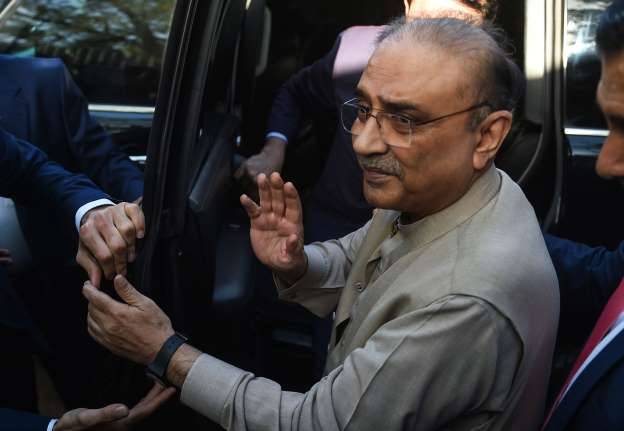ISLAMABAD - Co-Chairperson of Pakistan People’s Party Asif Ali Zardari Monday challenged the Supreme Court’s January 7 order regarding transfer of the case of money laundering through fake bank accounts from the Joint Investigation Team to National Accountability Bureau.
Zardari through his counsel Advocate Sardar Latif Khosa filed petition requesting the top court to review its earlier order. He further prayed that till the decision on instant review petition, the January 7 order be held in abeyance.
The top court had in its order given seven different directions including referring the matter to the NAB for fresh investigation and filing of reference within two months. The orders were issued after the JIT, which initially probed the matter, submitted its damning report against Zardari, his sister Faryal Talpur, Chairman PPP Bilawal Bhutto Zardari and Chief Minister Sindh Syed Murad Ali Shah, and terming the alleged abettors including owners of Omni Group as front men of Zardari.
After the 24-page written order, the NAB constituted a combined investigation team led by DG NAB, Rawalpindi, Irfan Naeem Mangi.
The review petitioner claims the directions mentioned in the earlier order of the top court are not warranted by law and based on assumptions and surmises.
Taking political cover, Zardari in his petition states that he had been made to suffer on account of political victimisation and he had been target of political vendetta and vengeance time and again, adding that due to this victimisation, he served rigorous imprisonment for accumulative period of 11 years.
It has been contended in the review petition that the top court’s January 7 order suffered from errors floating on the surface of the record and that powers under the Article 184 (3) were not unlimited and unfettered.
It has been further argued that the directions contained in the top court’s earlier order, of which review is sought, are prejudicial to the petitioner in any futuristic eventualities of the fair trial, a fundamental right envisaged under Article 10-A of the Constitution.
Zardari further argues that in the absence of any provision of law, a JIT comprising personnel of multifarious statutory departments could not be constituted.
“The impugned order commits an error in holding that the constitution of the JIT is a valid exercise of jurisdiction in aid of a lawful object.” “The issue of double jeopardy arises in the manner when the order under review keeps alive the JIT and authorises simultaneous inquiry of unresolved cases alongside NAB proceedings.”
It is further argued that the JIT has become functus officio with the conclusion of main case regarding alleged billions of rupees money laundering through fake bank accounts.
“No matter how heinous a crime, it should only be adjudicated at the proper forum without undue influence and external pressures,” the review petition contended, adding that the top court’s January 7 order failed to consider the enshrined principle of administrative law that what is to be done must be done in the manner prescribed and in no other manner.
“In facts and circumstances of the case and in the light of the JIT report, this court was not justified vide the impugned order in directing transmission of the JIT report along with material and evidence collected by the JIT to the NAB.”
Zardari in his petition further argues that JIT report had no evidentiary value and the top court was not justified in passing any order giving directions to the NAB and JIT thereby curtailing his rights.
The top court has nullified jurisdiction of criminal law and procedure, National Accountability Ordinance 1999, FIA laws, anti-corruption as well as banking laws and all other applicable laws in the province of Sindh by giving such order under review, the petition stated.
The direction in the order to the NAB to further probe the matter in Islamabad is not in accordance with the law when the same was not even discussed at the time of arguments, the petition stated.
It is further argued that shifting of probe to Islamabad when entire record, witnesses and accused persons pertain to Sindh and Karachi is also not justified.
“Faryal Talpur, sister of the petitioner, is mother of a special child and her other two daughters are school going in Karachi; any proceedings outside of the premises of Karachi shall prejudice her, so also her family and schooling of her children.”
The directions to Chairman NAB to designate a competent DG NAB for preparing and filing reference in a timely manner portrays the direction of filing references, the petition objected, adding that the likewise directions in the order are contradictory and are liable to be reviewed and set-aside.
It further added that the constitution of implementation bench is also unlawful when the same was not even prayed by the contesting parties.
Such binding dictates coming from the Supreme Court tantamount to obstructing the free flow of justice in the inquiry/investigation of NAB/JIT and is contrary to the authoritatively mandated in another case by seven-member larger bench, the petition contended.
It has also been argued that the JIT overstepped its mandate and asked for placement of names of 172 accused persons in Exit Control List (ECL) and the same was politically exploited.
“The entire business community, bureaucracy and government of the province of Sindh were strangled and the party in power at federal level exploited so much as to impose governor rule and thus shook the very foundation of democracy in the country”, the petition stated.






